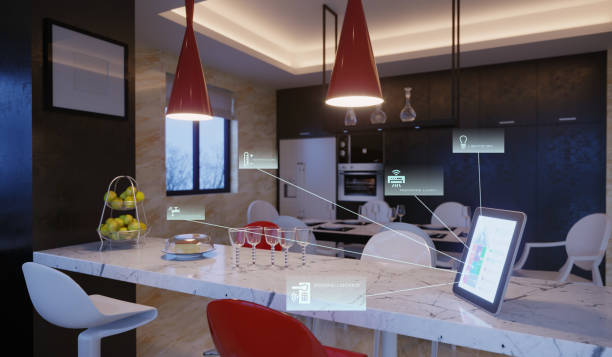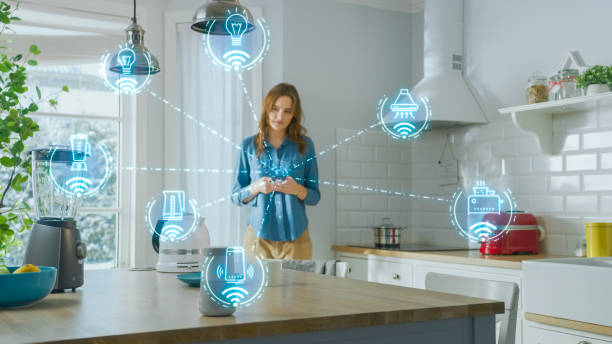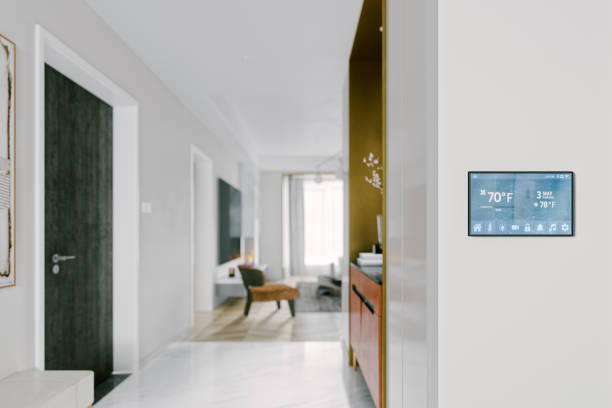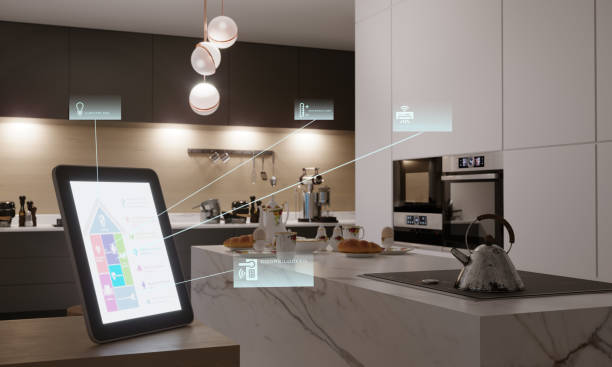The future of smart home technology
The future of smart home technology is advancing at a fast pace, with the result that it is changing fundamentally how people conduct their relationships with homes. With the new generation of home automation technologies at our doorsteps, it is worth assuming what is likely true about smart homes of the future, given the pace of technical change? Let alone slowly shifting from voice-controlled assistants to energy-efficient systems, the prospects seem almost infinite. Moving up, in this article we look at the trends that are surrounding the future of smart home technology and how they are likely to transform our home experiences.

Smart Home Technology Today
Now, let’s examine the current picture before a leap into the future: Consumer technology is gradually finding its way into our homes with smart speakers, thermostats, and security cameras, among other gadgets now common. Most of these gadgets are simply building blocks for what is set to be the future of convenience and ease that smart homes will bring.
Current Advance in Home Automation Technology
following are the home automation technology which can advance your home:
- AI and Machine Learning
- Integration of the Internet of Things (IoT)
- Energy Conservation and Sustainability
- Enhanced Home Security
- The Role of Voice Assistants
- Health and Wellness Integration
AI and machine learning
The future of smart home technology is tied up with artificial intelligence and machine learning from the ground up. These technologies will make our home smart, where the home itself will be able to understand and even anticipate our needs without us having to tell them. What kind of house automatically adjusts the light and the temperature when you’re feeling low? Or a kitchen that recommends recipes you could try based on the items in your refrigerator.
Integration of the Internet of Things (IoT)
When looking towards the future of pressure ulcer prevention, pressure ulcers could be prevented by the future of smart home technology. In the future, expectations are high that one device or system will interfere with another; in this case, there will be no formation of pressure ulcers. Several systems will be integrated, and the Internet of Things will be used for the integration of other smart devices. This will be an interconnectivity that will form the foundation of true smart home environments.
Energy conserving and sustaining
But one of the most exciting possibilities of the future of smart home technology is predicated on an ability to dramatically cut out energy use. Advanced systems for energy control will be developed and built with renewable electricity generation systems like solar power. This aspect of smart home tech is going to become all the more critical as debates around climate change rise.
Enhanced Home Security
The future of smart home technology will result in revolutionary changes in home security and the use of smart security technology. Smart security cameras, facial recognition technology, and prognostic tools will merge and guarantee a wall around our homes that cannot be breached. These systems will not only help in keeping intruders away but also help homeowners to know when they are in danger of falling prey to safety risks that may be with time to worse conditions.

The Role of Voice Assistants
Right from the present day, devices like Amazon Echo with Alexa, Google Home, and Apple Home Pod with Siri have already become a part of many intelligent homes. As we look to the future of smart home technology, these digital helpers are set to become even more sophisticated. They will transform from call-takers to capable performers of what is expected of them or even performers of what more is expected of a machine, performing natural dialogues.
Health and wellness integration
The future of smart home technology isn’t only about time-saving and getting more done; it is also about getting better as a human being. The community of smart homes in the future will include health monitoring equipment, air quality detectors, and mental health supportive equipment. Together with these innovations, the spaces that people use for living would self-generate to contribute to our overall health.
Privacy and Security Concerns
That being said, while moving towards the future of smart home technology, we have to face new challenges concerning privacy and the protection of personal information. The importance of the given issue is deserved by the fact that smart home devices accumulate and collect a progressively large amount of personal data about the user. Smart home systems of the future will have to become much more secure, while companies operating in this field will have to work on delivering full transparency of users’ data processing.
The Effect of Innovation on Architecture and Design
The future of smart home technology will be revolutionary for the way that architects and builders approach the creations of our living environment. The decision of how smart systems are to be incorporated into the design will become the responsibility of architects and interior designers right from the conceptual stage. This could extend to homes with concealed monitoring devices, a house that responds to the occupant, or rooms that can be adapted into different configurations on the arrival of new technologies.
Challenges and Obstacles
Despite the future of The future of smart home technology seems very promising, but there are several issues to address. One of the main challenges that have not been overcome is the issue of integration between different brands and systems. Also, the digital divide might be deepened because smart home technology will advance and may become expensive. Solving these problems will become vital for mainstreaming smart home technology.
The Human Element
When reading The Future of Smart Home Technology, this should always be kept in mind; the purpose is to improve the human experiences, not replace them. The most effective smart home innovations will be those that are easily adopted into our daily lives, making tasks a little less boring and difficult while not seeming like too much of an intrusion.

Difference Table
| Trend | Description | Benefits |
|---|---|---|
| AI and Machine Learning | Homes will learn and adapt to user needs. | Enhanced comfort and personalized living. |
| Integration of IoT | Seamless connectivity among devices. | Unified control and automation. |
| Energy Conservation | Smart tech for optimizing energy use and integrating renewables. | Reduced energy costs and environmental impact. |
| Enhanced Home Security | Advanced security systems like cameras and facial recognition. | Increased safety and peace of mind. |
| Voice Assistants | More capable and intuitive interactions with users. | Hands-free control and convenience. |
| Health Integration | Inclusion of health monitoring and air quality tools. | Support for physical and mental well-being. |
| Privacy Concerns | Addressing data collection and user privacy issues. | Building trust in smart technologies. |
| Impact on Design | Smart features integrated into architectural design. | Innovative, functional living spaces. |
| Challenges | Issues with brand integration and affordability. | Need for inclusivity in technology access. |
| Human Element | Enhancements should support, not replace, human experiences. | Improved daily life and user satisfaction. |
Conclusion
The future of smart home technology is an exciting domain with the opportunity to turn our homes, offices, and other environments into smart, efficient, and customizable spaces. Starting with intelligent systems that will sense our needs and smart homes with their environmentally friendly solutions, homes are about to undergo a radical transformation.
In the future, it would be important to note that such smart products must also be safe when it comes to privacy, and such technological advancements aimed at making homes smarter could be easily implemented in a defective home for all the positive results to be felt. Smart home integration may be a long process, but the benefits relating to comfort, reduction of energy and other resources, and the overall quality of our lives are enormous.
The future of smart home technology is not just about new fashionable devices; it is a concept of building spaces into which we move and with which we interact as with a living organism.
FAQs
What might its effect on energy consumption be?
A smart home with the use of AI and integration of renewable energy sources of electricity for heating, cooling, and lighting is likely to cut energy consumption significantly.
Will the smart homes of the future be for everyone, or just the privileged few?
Though integrated smart home systems are expensive, more and more entities are becoming available in the market. The added features are anticipated to be particularly beneficial to the consumer because, with the advancement and adoption of technology, the smart home features will more likely become affordable to a larger set of consumers.

